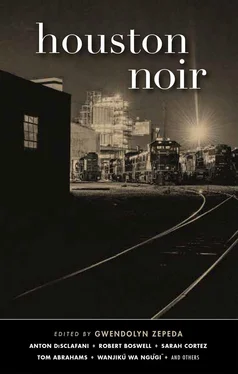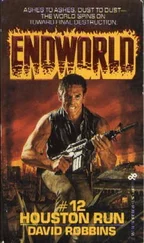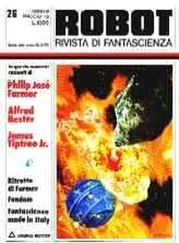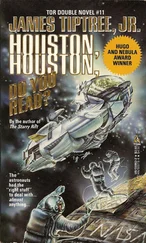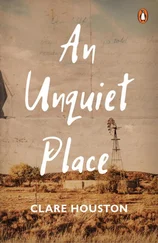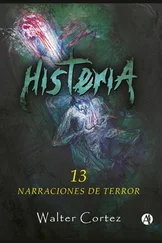Sarah Cortez - Houston Noir
Здесь есть возможность читать онлайн «Sarah Cortez - Houston Noir» весь текст электронной книги совершенно бесплатно (целиком полную версию без сокращений). В некоторых случаях можно слушать аудио, скачать через торрент в формате fb2 и присутствует краткое содержание. Город: New York, Год выпуска: 2019, ISBN: 2019, Издательство: Akashic Books, Жанр: Детектив, на английском языке. Описание произведения, (предисловие) а так же отзывы посетителей доступны на портале библиотеки ЛибКат.
- Название:Houston Noir
- Автор:
- Издательство:Akashic Books
- Жанр:
- Год:2019
- Город:New York
- ISBN:978-1-61775-706-8
- Рейтинг книги:3 / 5. Голосов: 1
-
Избранное:Добавить в избранное
- Отзывы:
-
Ваша оценка:
- 60
- 1
- 2
- 3
- 4
- 5
Houston Noir: краткое содержание, описание и аннотация
Предлагаем к чтению аннотацию, описание, краткое содержание или предисловие (зависит от того, что написал сам автор книги «Houston Noir»). Если вы не нашли необходимую информацию о книге — напишите в комментариях, мы постараемся отыскать её.
Houston Noir — читать онлайн бесплатно полную книгу (весь текст) целиком
Ниже представлен текст книги, разбитый по страницам. Система сохранения места последней прочитанной страницы, позволяет с удобством читать онлайн бесплатно книгу «Houston Noir», без необходимости каждый раз заново искать на чём Вы остановились. Поставьте закладку, и сможете в любой момент перейти на страницу, на которой закончили чтение.
Интервал:
Закладка:
Though Sanjay’s background was different from mine — he had been five when his family moved from New Delhi to Houston, and he considered the Bayou City his home — we spoke the same language. I was not yet familiar with the city and its enclaves. My family was in Karachi, and I had landed in Houston to pursue a doctorate in social work. Sanjay helped me find my two-bedroom rental down the street from campus, in a quiet East End neighborhood called Houston Country Club Place. Sanjay deemed the house safe for a single woman, but drawled, “You’ll be the only Pakistani around here!”
For the most part, when I worked on my papers at night, I was accompanied by croaking frogs, chirping crickets, and the passing cargo trains. No neighbors ever appeared, until one winter Thursday night, the Raincoat Hombre — as I later referred to him because the Spanish spoken in my new neighborhood had begun to seep into my system — appeared as if he had been teleported to the spot beneath the streetlight closest to my house. His khaki coat swung around him as he strode past Mr. Rodriguez’s crepe myrtle tree, and his hoodie cast a shadow on his face. The first time I saw him, I nearly fell out of my chair. But over the course of the month, I adopted a Thursday-night ritual: the freight train’s eleven p.m. whistle became my cue to set aside my seminar report, watch for the hombre, and ponder over where he was headed.
The murder was reported on the morning after Sanjay and I had attempted to track the Raincoat Hombre. That afternoon, after a day of listening to stories — a woman having an affair, a teenage boy struggling to inform his parents he liked boys, an older man trying to cope with his wife’s death — I took a moment to check my phone. An alert from my neighborhood association popped up on my screen:
Last night at 10:30 p.m., the body of Lawndale Street resident Mrs. Alicia Hernandez was found inside her car parked near Fiesta. An autopsy is being conducted. If you have information, please contact the police or the neighborhood association.
Registering that Alicia Hernandez’s body had been discovered just a few blocks from my house, I forwarded the e-mail to Sanjay. I also shot off a description of Raincoat Hombre to Mrs. Alfaro, the neighborhood association secretary, who I had briefly met.
Within minutes, she called me. “Would you like to come over for coffee tomorrow? You can tell me more about this mysterious man.” Curious to learn more about the murder, I agreed.
The following morning, Saturday, I walked to her house, one block from mine. Along the way, cars and trucks basked in the sun and oak branches fluttered in the breeze. Doves cooed. A police siren wailed on the other side of the railway track.
Clad in my adopted uniform — jeans and hoodie — I knocked on Mrs. Alfaro’s door. I had stopped wearing shalwar-kameezes and saris after the election.
Mrs. Alfaro served me iced tea, then settled in her rocking chair. “Tell me — you’ve seen someone mysterious wander our streets at night?” Her voice was squeaky. “No point talking to the police — yet. But I’ll alert the association. They can follow this man, to ask some questions.”
“I’d like to talk to him as well.” I sucked on a piece of ice.
Mrs. Alfaro pressed a hairpin into her gray hair and used her little finger to push up her glasses. “I don’t see why not. According to your story, though, we have till Thursday, yes?” She refilled my glass. “You know that the Hernandezes just moved here. Alicia was from Guatemala, and Luis is from South Texas. He’s a security officer in the medical center.”
I nodded. “I met them last month, at the Christmas concert at the convent. She seemed like a gentle woman.”
“That night, she was going downtown to meet a girlfriend, but she never left the East End.” Mrs. Alfaro’s words spilled like a soup pot bubbling over. “We didn’t want to frighten anyone, so we didn’t say more in the newsletter. They found Alicia in the backseat, wearing just her shirt and... panties. The murderer used her skirt to strangle her. She had bruises on her face — it was blue with punches. They say Luis was crying so much, he could hardly identify her.”
At ten thirty the following Thursday night, two men knocked on my front door, introducing themselves as part of the neighborhood watch team. I invited them to the backyard, where my landlord had left sagging chairs and a wooden table on the cement patio.
The older neighbor, David, said, “Our community is small, so we take responsibility to patrol blocks.” A stout man with a twirling mustache, he looked as if he was visiting from the eighteenth century. “We’ve caught burglars. But this is the first murder since I moved here thirty years ago.”
Juan, a tall man with wrinkles ironed into his forehead, nodded. He leaned against the wall. In the dim light, I glimpsed a flash of steel — a pistol tucked beneath his jean jacket.
“Where are you from?” asked David.
I tried not to flinch. “Pakistan.”
Neither man responded, but I knew the questions they didn’t ask: Isn’t that where terrorists come from? Followed by: Are you Muslim ?
The cargo train sounded its whistle, drowning out the cicadas’ whirs. We peered around the wall. The streetlights cast shadows, but no one was in sight. David and Juan waited another hour, but the street remained empty.
Luis Hernandez’s front door opened onto Lawndale Street, overlooking the steel gates of the Villa de Mittal convent. Hands shaking, Luis offered me iced tea. Several weeks had passed since his wife’s murder, and the police were no closer to solving the crime than they had been when it occurred. I had seen Luis at the nearby Fiesta Mart. When I greeted him, he responded with teary eyes and asked if I could help him. Without hesitation, I had agreed.
Now, leaning forward on his sofa, Luis tried to smile, but his lips trembled. “Perhaps you can look through her things and see if you want anything? Or you could give things away?”
I sorted through boxes of clothes in their bedroom while he watched from the doorway.
“I’m sure you’re tired of questions,” I commented.
“I’ve told the police everything I know. After she drove away to meet her friend, I went to my buddy’s house to watch a basketball game. The police called me around ten thirty that night.” Tears trickled from his eyes.
I replayed the time line in my mind. Luis had seen Alicia around six p.m., after the winter sun had dipped into the horizon. There was a four-hour window during which the murder occurred.
“I still have nightmares about how she must have suffered,” said Luis. “I want to go back to the Valley to be with my family, but it’s not so easy to get a job.”
Being a mental health counselor is like being a detective: both professions require listening skills. Growing up in Karachi, I heard our housekeeper share stories about her abusive husband. When my mother helped our housekeeper file for divorce, I served as babysitter for her daughter and listened to the little girl’s stories about hiding in the closet while her father struck her mother.
My mother and her friends had infused women’s rights into my blood. “I lived through General Zia’s times,” my mother told me. “We marched when I was sixteen. And we saw women’s rights being wiped like grease from a table. No one could produce enough witnesses to a rape or win a case contesting an honor killing.”
Religious extremism had fomented over the decades, especially as war escalated in Pakistan’s northern regions. Though my personal life remained unaffected — I was raised in a progressive home, attended a coed school, and experimented with drinking and sex in Karachi as well as in the United States — I saw many of my Karachi classmates embrace an extremist version of Islam.
Читать дальшеИнтервал:
Закладка:
Похожие книги на «Houston Noir»
Представляем Вашему вниманию похожие книги на «Houston Noir» списком для выбора. Мы отобрали схожую по названию и смыслу литературу в надежде предоставить читателям больше вариантов отыскать новые, интересные, ещё непрочитанные произведения.
Обсуждение, отзывы о книге «Houston Noir» и просто собственные мнения читателей. Оставьте ваши комментарии, напишите, что Вы думаете о произведении, его смысле или главных героях. Укажите что конкретно понравилось, а что нет, и почему Вы так считаете.
